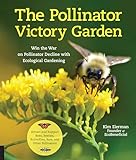The pollinator victory garden : win the war on pollinator decline with ecological gardening : how to attract and support bees, beetles, butterflies, bats, and other pollinators / Kim Eierman.
Material type: TextPublisher: Beverly, MA : Quarry Books, 2020Description: 160 pages : color illustrations ; 26 cmISBN:
TextPublisher: Beverly, MA : Quarry Books, 2020Description: 160 pages : color illustrations ; 26 cmISBN: - 9781631597503
- 1631597507
- QK926 .E34 2020
| Item type | Current library | Call number | Status | Date due | Barcode | Item holds | |
|---|---|---|---|---|---|---|---|
| Lending Books | Elisabeth C. Miller Library Tall Shelves | SB454.3.W5 E54 2020 (Browse shelf(Opens below)) | Checked out | 05/16/2024 | 39352800180655 |
Includes bibliographical references (pages 155-157) and index.
Essentials of pollinators and pollination -- Providing pollinators with a place to live -- Providing pollinators with food to eat -- Parade of pollinators -- Creating and growing a pollinator victory garden.
"The passion and urgency that inspired WWI and WWII Victory Gardens is needed today to meet another threat to our food supply and our environment-the steep decline of pollinators. The Pollinator Victory Garden offers practical solutions for winning the war against the demise of these beneficial animals. Pollinators are critical to our food supply and responsible for the pollination of the vast majority of all flowering plants on our planet.Pollinators include not just bees, butmany different types of animals, including insects and mammals. Beetles, bats, birds, butterflies, moths, flies, wasps, and even some mosquito species, can be pollinators. But, many pollinators are in trouble, and the reality is that most of our landscapes have little to offer them. Our residential landscapes, and many commercial landscapes, are filled with vast green pollinator deserts, better known as lawns. These monotonous green expanses are ecological wastelands for bees and other pollinators. By planting a bit differently and by tweaking your landscape aesthetic, you can transition your landscape into a pollinator haven. By using proper cultural practices in your garden, choosing the right plant for the right location, and by attracting "nature's pest control" (beneficial insects that act as natural enemies), you can keep nature in balance and give pollinators a fighting chance. The time is right for a new gardening movement. Every yard, community garden, rooftop, porch, patio, and corporate landscape can help to win the war against pollinator decline with The Pollinator Victory Garden"--
Pollinators are critical to our food supply and responsible for the pollination of the vast majority of all flowering plants on our planet. Bees, beetles, bats, birds, butterflies, moths, flies, wasps, and even some mosquito species, can be pollinators. But, many pollinators are in trouble, and most of our landscapes have little to offer them. Eirman offers practical solutions for winning the war against the demise of these beneficial animals. By planting a bit differently and by tweaking your landscape aesthetic, you can transition your landscape into a pollinator haven. -- adapted from back cover
